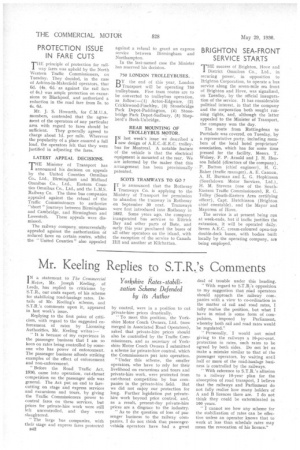Mr. Keeling Replies to S.T.R 's Comments
Page 56

If you've noticed an error in this article please click here to report it so we can fix it.
I N a statement to The Commercial Motor, Mr, Joseph Keeling, of Leeds, has replied to criticisms by S.T.R., our costs expert, of his scheme for stabilizing road-haulage rates. Details of Mr. Keeling's scheme, and S.T.R.'s comments upon it, appeared in last week's issue.
Replying to the first point of criticism, with regard to the suggested enforcement of rates by Licensing Authorities, Mr. Keeling writes :— " It is because of my experience in the passenger business that I am so keen on rates being controlled by someone who has power of enforcement. The passenger business affords striking examples of the effect of enforcement and non-enforcement, "Before the Road Traffic Act, 1930, came into operation, cut-throat competition on the passenger side was general. The Act put an end to farecutting on stage and express services and excursions and tours, by giving the Traffic Commissioners power to control fares on these services, but prices for private-hire work were still left uncontrolled, and they were slaughtered.
" The large bus companies, with their stage and express fares protected B42 by control, were in a position to cut private-hire prices drastically.
" To meet this position, the Yorkshire Motor Coach Owners, Ltd. (now merged in Associated Road Operators), asked that private-hire prices should also be controlled by the Traffic Commissioners, and as secretary of Yorkshire Motor Coach Owners I submitted a scheme for private-hire control, which the Commissioners put into operation.
"Under this scheme, the smaller operators, who have to rely for their livelihood on excursions and tours and private-hire work, were protected from cut-throat competition by bus com panies in the private-hire field. But we did not enjoy our protection for long. Further legislation put private hirework beyond price control, and, as a result, present-day private-hire prices are a disgrace to the industry.
" As to the question of loss of passenger business to the railway companies, I do not think that passengervehicle operators have had a great deal of trouble under this heading.
" With regard to S.T.R.'s opposition to my suggestion that road operators should approach the railway companies with a view to co-ordination in the matter of rail and road rates, I fully realize the position, but what I have in mind is some form of compulsion, imposed by Parliament, whereby both rail and road rates would be regulated."
" Personally, I would not mind giving to the railways a 10-per-cent. protection in rates, such rates to be agreed by both sides. Do not let us make a mistake similar to that of the passenger operators, by waiting until half or more of the road-haulage business is controlled by the railways.
" With reference to S.T.R.'s allusion to a railway 10-year plan for the absorption of road transport. I believe that the railways and Parliament do not fully realize how many holders of A and B licences there are. I do not think they could be exterminated in 100 years.
" I cannot see how any scheme for the stabilization of rates can be effective unless an operator knows that to work at less than schedule rates may mean the revocation of his licence."




























































































